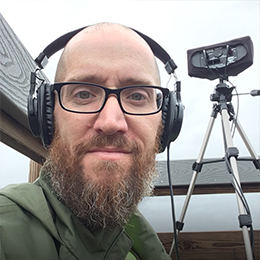Nathan Wolek
 Why did you choose Northwestern?
Why did you choose Northwestern?
In the late 1990s, Northwestern was one of the few universities that had a doctoral program focused on Music Technology. The School of Music had a reputation for excellence in both research and teaching, which was important to my goals of becoming a college professor. It really was these two things in balance that shaped who I am today.
How would you describe your research and/or work to a non-academic audience? What was it then and/or what it is now?
I am a sound artist and audio researcher. I currently focus on field recording, which involves using portable equipment to capture sounds out in the world. I also have extensive experience with computer programming which impacts what I do with the audio material that I collect. During my doctorate, I would have identified more as a "music technologist", but I find that label too limiting now. Sound is conceptually broader than music, and intersects with other disciplines in a different way than music.
Tell us who or what inspired your research and/or work.
Looking back at Northwestern, my professors offered options to get involved in research and creative projects, then trusted me with a lot of responsibilities very quickly. Gary Kendall and Amnon Wolman had a knack for asking interesting questions, then setting me off in search of answers. That is something I have tried to emulate with my own students. They also had *many* connections to disciplines beyond music, things like computer science, acoustics, film & television, audiology, and psychology. It's little wonder that I started to see connections with sound across the academy.
What are you most proud of in your career to date?
I am two-time Fulbright Scholar. For my 2012 award to Norway, I worked on the Jamoma software project in collaboration with members of the Bergen Center for Electronic Art. It was also during this experience that my interest in installation art was renewed, which changed the direction of my artistic output. For my current 2021 award to Scotland, I am studying the local soundscape in public parks and nature preserves as the Fulbright-Scotland Visiting Professor at the University of Aberdeen. The challenges of an academic exchange during the COVID pandemic were daunting, but it has solidified my belief that we need to do a better job educating people about the soundscape. Getting outside is not just about exercise and fresh air, but also resting and reseting our ears.
Tell us about a current achievement or something you're working on that excites you.
In 2020, I helped launch Young Sound Seekers, a program to create opportunities for blind and partially sighted youth at Canaveral National Seashore. Our goal is to use field recording and listening excursions as a way to teach these students a vocabulary that helps them be more effective advocates for the soundscape. The project is supported by a five-year grant from the Natural Sounds and Night Skies Division of the National Park Service. More information can be found here: https://atlanticcenterforthearts.org/youngsoundseekers/.
What advice would you give your younger self or someone considering a similar path?
Take time to travel and explore other cultures, even if your research doesn't necessarily require it. Meeting people from other countries and cultures that share your interests can open up new ways of understanding the thing that you study. Participating in cultural exchanges has really deepened my understanding of sound and technology over the years. I can pretty confidently say that I would not have my current interests without them.